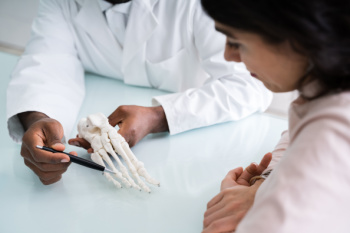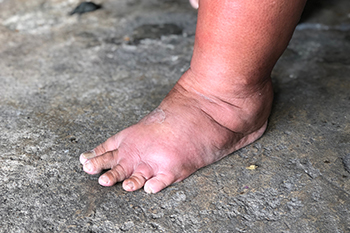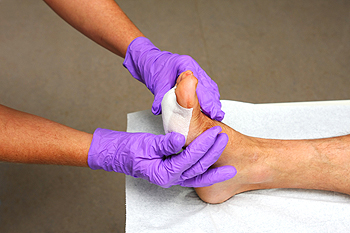November 2024
Why You May Need to See a Podiatrist

Seeing a podiatrist is essential for anyone facing foot or ankle discomfort, as these specialists offer targeted expertise in foot health and mobility. From common conditions like bunions and plantar fasciitis to more complex issues, such as fractures or tendon injuries, a podiatrist can provide tailored treatment options. These foot doctors can prescribe custom orthotics, medication, and even surgery when necessary. Diabetic patients, in particular, benefit from regular care from a podiatrist to monitor for potential complications, like nerve damage, infections, or ulcers that may impact their overall health. Additionally, athletes with sports-related injuries often find that podiatrists can support faster recovery and improve performance through specialized treatments. For runners with gait imbalances or older adults dealing with balance issues, a podiatrist can offer measures that improve comfort and stability. If you have foot, toe, or ankle pain, it is suggested that you make an appointment with a podiatrist for an exam, diagnosis, and appropriate treatment.
If you are experiencing pain in the feet or ankles, don’t join the stubborn majority refusing treatment. Feel free to contact Dawn Miles, DPM from Florida. Our doctor can provide the care you need to keep you pain-free and on your feet.
What Is a Podiatrist?
Someone would seek the care of a podiatrist if they have suffered a foot injury or have common foot ailments such as heal spurs, bunions, arch problems, deformities, ingrown toenails, corns, foot and ankle problems, etc.
Podiatric Treatment
A podiatrist will treat the problematic areas of the feet, ankle or lower leg by prescribing the following:
- Physical therapy
- Drugs
- Orthotic inserts or soles
- Surgery on lower extremity fractures
A common podiatric procedure a podiatrist will use is a scanner or force plate which will allow the podiatrist to know the designs of orthotics. Patients are then told to follow a series of tasks to complete the treatment. The computer will scan the foot a see which areas show weight distribution and pressure points. The podiatrist will read the analysis and then determine which treatment plans are available.
If you have any questions please feel free to contact one of our offices located in Palatka and Saint Augustine, FL . We offer the newest diagnostic and treatment technologies for all your foot and ankle needs.
Foot and Ankle Injuries in Kids and Teens

Foot and ankle injuries are common in kids and teens, particularly those involved in sports or physical activities. Growth spurts, active play, and the demands of youth athletics place unique stress on developing bones, ligaments, and tendons. Common injuries include ankle sprains, heel pain, often from Sever’s disease, stress fractures, and overuse injuries from repetitive motion, such as running or jumping. Sever’s disease, or calcaneal apophysitis, occurs when the growth plate in the heel becomes inflamed due to repetitive stress or overuse, causing heel pain and tenderness that often worsens with activity. Symptoms typically include pain, swelling, and difficulty in bearing weight. Treatment often involves rest, and a podiatrist may recommend targeted exercises or custom orthotics. If your child has incurred a foot or ankle injury, it is suggested that you visit a podiatrist for a proper diagnosis and treatment.
Foot and ankle trauma is common among athletes and the elderly. If you have concerns that you may have experienced trauma to the foot and ankle, consult with Dawn Miles, DPM from Florida. Our doctor will assess your condition and provide you with quality foot and ankle treatment.
Foot and ankle trauma cover a range of injuries all over the foot; common injuries include:
- Broken bones
- Muscle strains
- Injuries to the tendons and ligaments
- Stress fractures
Symptoms
Symptoms of foot and ankle injuries vary depending on the injury, but more common ones include:
- Bruising
- Inflammation/ Swelling
- Pain
Diagnosis
To properly diagnose the exact type of injury, podiatrists will conduct a number of different tests. Some of these include sensation and visual tests, X-rays, and MRIs. Medical and family histories will also be taken into account.
Treatment
Once the injury has been diagnosed, the podiatrist can than offer the best treatment options for you. In less severe cases, rest and keeping pressure off the foot may be all that’s necessary. Orthotics, such as a specially made shoes, or immobilization devices, like splints or casts, may be deemed necessary. Finally, if the injury is severe enough, surgery may be necessary.
If you have any questions, please feel free to contact one of our offices located in Palatka and Saint Augustine, FL . We offer the newest diagnostic and treatment technologies for all your foot care needs.
The Connection Between Swollen Feet and Diabetes

Swollen feet can be a significant concern for individuals with diabetes, often signaling underlying health issues. Diabetes can lead to poor circulation and nerve damage, resulting in fluid retention in the extremities. When blood sugar levels are consistently high, it can cause blood vessels to narrow, impairing circulation and leading to swelling. Additionally, diabetics are at an increased risk for conditions like peripheral edema and kidney disease, both of which can cause foot swelling. It is essential for those with diabetes to monitor their feet regularly, as swelling may indicate complications that require medical attention. If diabetes has caused your feet to become swollen, it is suggested that you are under the care of a podiatrist who can help you to manage this condition.
Swollen feet can be a sign of an underlying condition. If you have any concerns, contact Dawn Miles, DPM of Florida. Our doctor can provide the care you need to keep you pain-free and on your feet.
Swollen feet are a common ailment among pregnant women and people who stand or sit for extended periods. Aging may increase the possibility of swollen feet and patients who are obese often notice when their feet are swelling too. There may be medical reasons why swollen feet occur:
- Phlebitis - A condition that causes the veins to become inflamed and can also cause leg pain.
- Liver disease - This may lead to low blood levels of albumin which is a protein. This can cause fluid in the blood to pass into the tissues and several areas of the body can become swollen.
- Heart failure - When the heart doesn’t pump properly the blood that is normally pumped back to the heart can pool in the veins of the legs causing swollen feet.
- Kidney disease - One of the main functions of the kidneys is releasing excess fluid in the body. This type of condition can make it difficult for the kidneys to function properly, and as a result the feet may become swollen.
- Deep-vein thrombosis (DVT)- This is a serious condition where blood clots form in the veins of the legs. They can block the return of blood from the legs to the heart which may cause the feet to swell. It is important to be treated by a podiatrist if this condition is present.
Swollen feet can also be caused by bone and tendon conditions, including fractures, arthritis, and tendinitis. Additionally, there may be skin and toenail conditions and an infection may cause the feet to swell. Patients who take medicine to treat high blood pressure may be prone to getting swollen feet.
Many patients elevate their feet to help relieve the swelling and this is generally a temporary remedy. When a podiatrist is consulted the reason behind the swelling can be uncovered and subsequently treated.
If you have any questions please feel free to contact one of our offices located in Palatka and Saint Augustine, FL . We offer the newest diagnostic tools and technology to treat your foot and ankle needs.
Foot Wound Healing Delayed in Diabetic Patients

Foot wounds in diabetics often take longer to heal due to several interconnected factors. Elevated blood sugar levels can impair circulation, reducing blood flow to the extremities and hindering the delivery of essential nutrients and oxygen required for healing. Additionally, diabetes can damage nerves, leading to reduced sensation in the feet, which may cause injuries to go unnoticed and untreated. Furthermore, weakened immune responses in diabetic patients can increase the risk of infections, complicating the healing process. The combination of these factors creates a challenging environment for wound recovery, making it essential for diabetics to monitor their foot health closely. Regular check-ups from a podiatrist and proactive care can significantly reduce the risk of complications. If you have diabetes and have developed a foot wound, it is strongly suggested that you are under the care of this type of doctor who can help you to manage this condition.
Wound care is an important part in dealing with diabetes. If you have diabetes and a foot wound or would like more information about wound care for diabetics, consult with Dawn Miles, DPM from Florida. Our doctor will assess your condition and provide you with quality foot and ankle treatment.
What Is Wound Care?
Wound care is the practice of taking proper care of a wound. This can range from the smallest to the largest of wounds. While everyone can benefit from proper wound care, it is much more important for diabetics. Diabetics often suffer from poor blood circulation which causes wounds to heal much slower than they would in a non-diabetic.
What Is the Importance of Wound Care?
While it may not seem apparent with small ulcers on the foot, for diabetics, any size ulcer can become infected. Diabetics often also suffer from neuropathy, or nerve loss. This means they might not even feel when they have an ulcer on their foot. If the wound becomes severely infected, amputation may be necessary. Therefore, it is of the upmost importance to properly care for any and all foot wounds.
How to Care for Wounds
The best way to care for foot wounds is to prevent them. For diabetics, this means daily inspections of the feet for any signs of abnormalities or ulcers. It is also recommended to see a podiatrist several times a year for a foot inspection. If you do have an ulcer, run the wound under water to clear dirt from the wound; then apply antibiotic ointment to the wound and cover with a bandage. Bandages should be changed daily and keeping pressure off the wound is smart. It is advised to see a podiatrist, who can keep an eye on it.
If you have any questions, please feel free to contact one of our offices located in Palatka and Saint Augustine, FL . We offer the newest diagnostic and treatment technologies for all your foot care needs.










